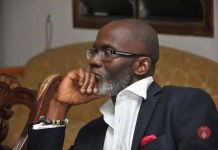A former journalist with Accra-based Metro TV, who had been the subject of widespread rumours that he was a homosexual, has finally admitted to being just that.
In a Zoom interview with Accra-based Joy News, Mr. Annor who is now based in the UK said he was afraid of admitting his gay alignment because he was afraid of the social consequences, including losing his job.
“This is going to be the very first time that I am using your medium to say that not only am I an activist for the rights of Africa’s sexual minorities, what you will call the LGBTQI community, but I am gay,” the homosexual admitted.
“Obviously, I denied it because I was afraid of losing my job, I was working at an incredible Television station in Accra and also for the fear of what would happen to me personally,” he told JoyNews.
Mr. Annor is now also an activist for gay rights.
Ignatius Annor had been suspected to be a homosexual since he was a student at the Keta Business Secondary School (KETABUSCO). Rumors of his queer sexual alignment had continued to hover around him while working as a journalist with Metro TV in Accra.
But he had always denied his orientation, something he says he did out of fear.
Even so, he told Joy News that after he had travelled for further studies abroad, he returned to the country but could not work because no company would accept on account of his sexual alignment. “And that’s just because of the stigma that surrounds my community,” he told JoyNews.
Currently, he works with Euronews-English where he claims he does not face the stigma and hurdles that he faced in Ghana over his gay orientation.
He wants the laws criminalizing the gay lifestyle in Ghana to be repealed; that is section 104 of the Criminal Code, 1960.
“Those laws [that exists currently] could be scrap out of the books of the Republic of Ghana so that people like myself who have life, who work, and contribute to the socio-economic fibre of the Republic of Ghana can be accepted as human beings deserving of respect, kindness and dignity,” he said.
He adds that with the presence of such laws, “It doesn’t feel like I am a human being who deserves the right to employment, the right to education, and normally the basic rights to be able to walk, drive around to wherever that I want to go to in Ghana as an openly gay man. It doesn’t feel okay, it feels dehumanising and awful.”










